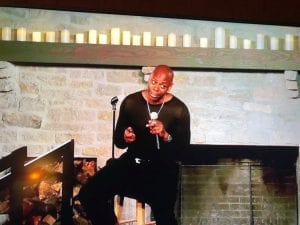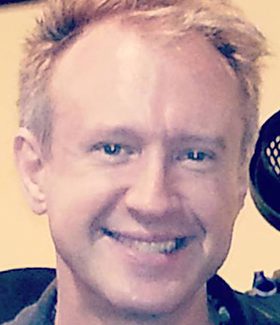Chappelle Needs To Be Heard, Not Canceled, When It Comes To Social Inequality
There’s a common phrase used in social justice circles: Pass the mic.
Pass the mic means, metaphorically, to let others talk, and it’s usually used in regard to people of color.
It’s a reminder that we need to listen to those people of color because their experience is different from ours if we’re white. While, yes, we  certainly may share many commonalities, particularly in regard to economic situations if we’re among the same economic strata, there is also an intrinsic bias many in society hold based upon appearance, notably skin color, and regardless of commonalities of economic strata, that bias has a profound impact.
certainly may share many commonalities, particularly in regard to economic situations if we’re among the same economic strata, there is also an intrinsic bias many in society hold based upon appearance, notably skin color, and regardless of commonalities of economic strata, that bias has a profound impact.
Ergo, “pass the mic.”
Pass the mic to hear someone else’s story and experience.
Pass the mic to listen to their story.
Pass the mic to better understand their experience, to better understand their perspective based upon their background and how it’s influenced and impacted their lives and their way of thinking, so that we can get a better understanding of the entirety and complexity of situations rather than making overly simplified judgements based more upon our own perspectives and inclinations.
And so, really, it’s about more than just passing the mic.
It’s about listening, and thinking about what you’ve heard, when that other person is talking.
Listening, when the mic is in their hand.
I’ve been thinking about this terminology in regard to the controversy surrounding Dave Chappelle’s latest Netflix special, “The Closer.” The show, which is made up of Chappelle’s unique blend of stand-up comedy and social observation, is the last of his current series of Netflix specials, and as he says repeatedly within it, it’s the summation of the themes he’s hit upon throughout all of them, predominantly dealing  with equality, power dynamics, biases, and what it actually means to be treated and considered as equals in society.
with equality, power dynamics, biases, and what it actually means to be treated and considered as equals in society.
These are not easy subjects. They’re messy and complicated and ever-changing due to the constantly evolving social dynamics, and they’re open to perpetual examination and questioning as those dynamics change, and that’s reflected in Chappelle’s delivery, material, and his own contemplation and commentary on it and how it evolves and shifts between the specials.
“The Closer” is by far the riskiest and most confrontational of all of the specials, and by far the most messy and complicated. It doesn’t offer easy solutions, nor does it offer the prettiest of them, but what it does offer is a raw and honest perspective and examination of them, filtered through the experiences and voice of an intelligent and erudite person of color.
There is no need to pass the mic here. Chappelle holds on to it tightly for more than an hour, and what he says is often uncomfortable and confrontational. But it’s also vital. And it’s also worthy of consideration, contemplation, and above all, worth LISTENING to.
The mainstream media, always looking for confrontation to boost ratings and clicks to rescue their dying paradigm, has pushed the narrative that Chappelle is transphobic and that “The Closer” is simplistically hateful and bigoted. People, many of whom openly admit to not having even seen the special, have commented in that media and online about it as if they have any idea what it’s about beyond what they’ve heard. But if you watch “The Closer,” and really, really LISTEN to what Chappelle has to say, you’ll understand.
“My problem has never been with trans people,” Chappelle says, with customary candor, “it’s been with white people.”
And, if you actually watch and listen to not just “The Closer,” but his other Netflix specials, and his entire body of work, you’ll see that’s a common theme — racial inequities and disparities, and how the system, largely led by white people in power, propagates them and racial divisions in general to maintain the power structure of the elites.
When he comments on the fact that many of the most prominent voices of protest in the trans community are white males transitioning, he’s not commenting on their gender switch, he’s talking about the fact that regardless of it, their initial power as white males transitions over with them, and that it points out a systematic racism that that transition and its power retention is in stark contrast to the more difficult road for people of color to achieve that same level of power within the system. He literally says this, pointing out that just as people of color were starting to “catch up” to the power levels and equality with white males, they “flipped the switch,” and became not just women, but trans women, and therefore a minority class of their own, and one with seemingly an even greater cache of “protected status” than people of color. Whether you agree with him or not, whether you think this is an over-simplification or not, it is a provocative idea worth exploring in the realm of culture, and certainly an understandable position for a person of color to take, as Chappelle points out in several examples.
“It was easier for Bruce Jenner to change his gender than it was for Cassius Clay to change his name,” Chappelle said in an earlier special, and repeats for emphasis in “The Closer.” He also mentions, correctly, that rap star DaBaby was never canceled or had any career repercussions for the fact that he killed a person of color in an altercation, but he was swiftly banned for transphobic and homophobic slurs.
“You can kill (an African-American person), but you can’t hurt a gay person’s feelings,” Chappelle says in regard to the incident.
And it’s a good point. I’m not saying, and certainly anyone with compassion and logic is not saying, that either is good. However, what Chappelle is correctly pointing out is that one is condemned with far more force than the other, and not the one which you would think would garner that swifter and harsher condemnation.
And therein lies Dave Chappelle’s “problem,” such as it is, with the LGBTQ community. As a person of color, as an African-American who has experienced discrimination, he’s both amazed and resentful at how much more quickly they have gotten closer to equality, respect, and a recognition of human rights than people of color have.
How do I know this?
Because he repeats it several times, not just in “The Closer,” but throughout his specials.
He mentions Colin Kaepernick. He mentions Cassius Clay. He mentions Sojourner Truth. He mentions George Floyd. He mentions several other examples of people of color who were not treated equally, some with incredible cruelty, all with alienation and scorn.
And then he mentions Caitlin Jenner, noting “Caitlin Jenner was named Time magazine’s Woman of the Year and she’d barely been a woman for a year.”
It’s a dynamic that’s provocative and worthy of examination, one which Chappelle, as a social commentator and a person of color, has every right to examine. And, as a human being, as someone who has suffered from inequality, has every right to his anger and resentment over when examining it.
And one of the most prominent commentators, perhaps the most prominent, in terms of celebrity trans people, agrees. Caitlin Jenner tweeted today, “Dave Chappelle is 100 percent right. This isn’t about the LGBTQ movement. It’s about woke cancel culture run amok, trying to silence free speech. We must never yield or bow to those who wish to stop us from speaking our minds.”
That’s admirable coming from Jenner, especially given that she’s been the frequent butt of some of Chappelle’s jokes. But, as Jenner has commented before, when asked about them, she respects that Chappelle has a right to tell those jokes, and has a right to his perspective. Chappelle has likewise said the same. He doesn’t claim to have all the answers, but he is trying to start a discussion about the questions.
“I’m not saying I’m right and you have to agree with everything I say, I’m just asking you to listen to what I’m saying,” Chappelle says.
And what he’s saying is worth hearing, whether you agree with it or not, because it brings up topics which need to be discussed, not for superficial condemnation, but for complex contemplation. That need to be examined, need to be brought out into the open, to enact positive change.
And that’s what people should, and would, get from actually watching “The Closer,” from actually watching Chappelle’s Netflix specials, instead of letting the media tell them what the narrative should be regarding them.
That’s what people would get if they actually listened to him.
Actually listened to this person of color with something to say.
The mic is in his hands. Literally. Are you going to listen?











